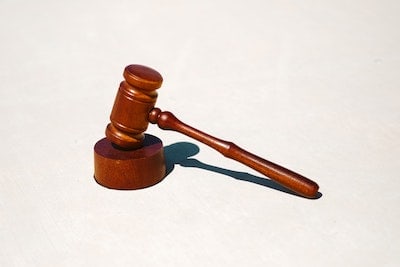Understanding How You Are Picked for Jury Duty
Have you ever wondered why people are chosen for jury duty? I took some time to find out how the selection process works, along with a lot of other interesting information.
Why was I picked for jury duty? District court randomly selects citizens’ names from lists of registered voters and people with driver’s licenses who live in a certain district. If you’ve received a summons to serve as a juror, it means you’ve been randomly chosen to appear for jury duty on a particular date.
Let’s take a closer look at what it means to be selected for jury duty.
What is Jury Duty?
Jury duty is a civic responsibility. It’s an obligation of citizens of the United States to participate in the judicial process. A summons is sent by a court to appear on a particular day and time to potentially serve on a jury. When you serve on a jury, you’re ensuring the defendant’s Sixth Amendment right to a speedy trial and an impartial jury. The juror selection process is designed to represent a cross-section of the community in which you live, without regard to race, gender, national origin, age, or political affiliation.
How Does Jury Duty Work?
When you are called for jury service, you will receive an official summons informing you to be available at a particular date, time, and place. When you arrive at the court you are assigned to, you will be asked to fill out a questionnaire and participate in the jury selection process. In some communities, you can call the court the night before your date to find out whether your service is needed the next day. But state laws address jury duty and can vary from state to state. Be sure to check with your state’s labor department for jury duty laws that pertain to your state.

From Jury Pool to the Jury Box
Once you’re summoned to court, you may not actually serve on a jury. When a trial needs a jury, if you’re in a group of qualified jurors, you’ll be taken to a courtroom where the trial will take place. The Oklahoma City Business Lawyer and the judge will question you and the rest of the potential juror group to determine suitability to serve on the jury. This process is known as “voir dire” which means to “speak the truth” and it is an important part of a jury trial for both the defense and prosecution.
The purpose of voir dire is to vet the jury by identifying jurors who can be fair and impartial, rather than biased and unfair pertaining to a particular side of the case or the entire criminal justice system. If a potential juror knows anyone involved in the case, has information about the case, or has strong prejudices about the issues or people involved in the case, he or she will be excused by the judge or by the attorneys. These individuals can exclude a certain number of jurors without giving a reason.
What Types of Cases are Heard by Juries
The federal courts use juries for two types of judicial proceedings.
Civil Cases
A civil case is filed by a private party – either an individual or a corporation – against another individual or corporation. A civil case begins when a person or entity, called the plaintiff, claims that another person or entity, called the defendant, has failed in some capacity to carry out a legal duty owed to the plaintiff.
At least six people make up a civil jury. In a civil case, the burden of proof is a preponderance of the evidence and the jury must come to a unanimous decision unless specified otherwise. The members of this type of case are represented by a Civil Litigation Attorney.
Criminal Cases
Individuals participating in a criminal trial have been accused of committing an act that’s considered a crime against society. Twelve people, plus alternates, constitute a criminal jury and they have to unanimously decide that a defendant is guilty. The prosecution must prove the crime was committed “beyond a reasonable doubt.” If a defendant pleas guilty or negotiates a plea, it reduces the need for a jury in a criminal case.

Can I Get Out of Jury Duty?
Jury duty is a legal obligation. It is possible, however, to request an exemption to be excused from it altogether. Medical or physical conditions are grounds for exemption if accompanied by a doctor’s note. If you are 70 or older, you do not need a note. You can claim a “hardship” exemption if serving on a jury will result in critical loss of wages or you need to be home to take care of a child or elderly relative. Being a full-time student is also an acceptable reason for possible exemption.
What Happens If I Don’t Show Up for Jury Duty?
If you are called for jury duty, you must appear before the court or risk being held in contempt of court. The judge may require you to appear at a hearing to explain your absence by issuing an order. If you ignore a jury summons, you could face a fine, jail time, or both.
If you miss jury duty by accident, call the court immediately and explain. The summons you received should have a phone number on it that you can call. You might find that your number wasn’t needed and even if it was, chances are you will be given another date to serve on a jury.
Why Do Some People Get Called for Jury Duty More Than Others?
Getting called for jury duty is as simple as the luck of the draw. Some people receive four jury summons in a decade while another person hasn’t gotten one. The selection system is completely random with prospective jurors randomly being picked by a computer from the jury pool. The pool, in most states, is a combined list of names from the driver’s license database and voter registration rolls.
If your name is in the jury pool, there is no limit to how many times you can be flagged for jury duty. Once you report for service, your name is pulled from the jury pool for at least 12 months.
Time Off and Pay for Jury Duty
Jury duty is mandated by law. Employers in almost every state are legally required to give employees time off from work to perform their civic duty. If missing work might significantly impact your employer, the employer can write a letter to the court. The court will consider the request for postponement on a case-by-case basis.
Some states, including Oklahoma, prohibit employers from requiring employees to use vacation, sick, or personal time for jury duty. Federal law also prohibits employers from terminating an employee who is required to report for jury duty. Employees must be allowed to report back to work following their jury duty.
Workers who receive paid jury duty are based on the job title, job level, type of work, industry, and location. Only eight states, excluding Oklahoma, require employers to pay their employees while serving jury duty.
Why Do Jurors Get Dismissed?
A juror can get dismissed for a couple of different reasons. If he or she is a relative or close friend of one of the parties or lawyers, or if he or she works for a company that is part of the personal injury lawsuit. Lawyers can ask a judge to reject potential jurors who they think are biased or incapable of following the law.
They can also dismiss a certain number of unbiased jurors for no reason at all. Other reasons a potential juror might get dismissed include:
- Personal experiences may affect the potential jurors’ ability to judge the case.
- Refusal to consider the sentence, including the death penalty.
- Extreme feelings about the government or the judicial system.
- Predisposition to believe certain individuals, such as police officers, involved in the case.
- Biased toward a defendant’s lifestyle, race, or occupation.
- Exposure to pre-trial publicity.
We hope this information provides you with greater insight into the process of jury duty! You can find more simple legal information here.








